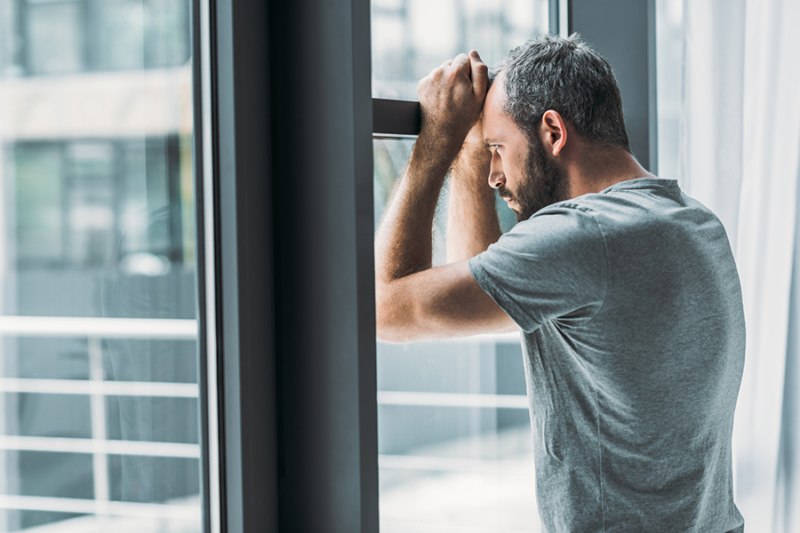Suffering from mental health issues can leave a person feeling isolated, but in fact, almost a quarter of all Arizonians have experienced mental illness in the past year. Our addiction and mental health specialists can help people with moderate to severe mental illness recover from addiction to any unhealthy substance or behavior. Whatever reason you have for looking into treatment options, Camelback Recovery is a dual diagnosis treatment center in Phoenix, Arizona, to get you or your loved one back on the path to a healthy life.
Get help now by calling 602-466-9880 or click here to use your insurance benefits to start treatment at our dual diagnosis treatment facility.

What Is a Dual Diagnosis?
When a person experiences addiction with co-occurring mental health issues, they’re considered to have a dual diagnosis. The symptoms of mental illness and substance abuse can be very similar, including:
- Mood swings
- Sleep disturbances
- Erratic behavior
- Isolation and withdrawal from friends and family
- Paranoid ideations and delusions
- Visual or audible hallucinations
- Difficulty focusing on tasks
Individuals with dual diagnoses need specialized care from an experienced mental health professional who also understands substance use disorders. At Camelback Recovery, we offer dual diagnosis treatment in Arizona through outpatient programs as well as virtual coaching and luxury sober living.
Addiction Treatment
While not everyone with a substance abuse problem also faces mental illness, we know that over 17 million Americans do. Depending on the type and severity of the disorder, people may choose to self-medicate with various substances to alleviate some of their symptoms. For example, a depressed person may turn to substances or harmful behaviors like gambling to feel happy. Because the effects are temporary, they have to repeatedly engage in unhealthy behavior, leading to an addiction.
Those with personal factors like a family history of mental illness or addiction can be especially vulnerable to substance abuse disorders. Alcoholism and drug addiction can be particularly hard to deal with when they’re experienced along with a mental illness such as bipolar disorder. This combination of issues requires dual diagnosis treatment that can address the substance abuse disorder along with any existing mental disorders. Camelback Recovery dual diagnosis treatment centers help people struggling with addiction to the following substances as well as co-occurring mental disorders:

Mental Health Disorders
The National Institute of Mental Health reported in 2020 that nearly 53 million Americans were living with some form of mental illness or one in five. Though mental illness treatment programs dramatically increase the success of living independently, unfortunately, less than half of these people seek treatment. There is a range of influences that affect an individual’s chances of developing mental health disorders, such as family history and genetic predisposition, environmental factors, and adverse childhood experiences (ACEs). Camelback dual diagnosis recovery center recovery experts treat clients experiencing mental disorders such as:
- Social anxiety disorder and other forms of anxiety and panic disorders
- Depression, including postpartum and post-traumatic stress disorder (PTSD)
- Bipolar disorder, borderline personality disorder and schizophrenia
- Autism spectrum disorders and obsessive-compulsive disorder (OCD)
- Eating disorders and behavioral issues such as an addiction to sex, video games, or gambling
- Addiction to drugs or alcohol
- Self-injury (such as cutting or hair pulling)
- Trauma
According to research, addiction and mental health disorders go hand in hand. About half of people living with a substance abuse problem experience a co-occurring mental health issue, and about half of those with a mental health condition report self-medicating with drug or alcohol use. While the problem is unfortunately common, everyone’s needs are different. Among the numerous evidence-based therapies used for dual diagnosis at Camelback Recovery treatment center, clients are helped through:
- Individual talk therapy
- Family therapy
- Past trauma-focused cognitive
- behavioral therapy (CBT)
- Coaching in life skills
- Sober companions
- Group therapy, including 12-step substance abuse programs like AA/NA
- Dialectical behavior therapy (DBT)
- Medication management
- Motivational interviewing
- Healthy meal services
Personality Disorders
Personality disorders are a group of mental health conditions that affect how individuals think, feel, and behave. They often involve patterns of rigid and unhealthy thoughts and behaviors, making it challenging to relate to others or function in daily life. These conditions can cause difficulties in relationships, work, and emotional well-being. While the exact causes vary, they often result from a combination of genetics, childhood experiences, and environmental factors. With proper treatment, such as therapy and, in some cases, medication, individuals can learn to manage symptoms and improve their quality of life.
Some common personality disorders are:
Partial Hospitalization Program (PHP)
Clients participating in partial hospitalization utilize a more structured program with daily therapy that allows them to continue working or going to school. People in a PHP are experiencing mental health disorders or co-occurring disorders that interfere with their daily lives but aren’t severe enough to require full hospitalization. Otherwise known as day treatment, these programs require several hours of participation daily. These individuals may experience co-occurring disorders such as alcohol abuse but are highly motivated to recover, have a strong support network, and can live independently.
After completing a mental health PHP, clients can move up into the intensive outpatient treatment program, and then to ongoing recovery support. The Camelback Recovery treatment center support team creates treatment plans tailored to each individual’s treatment needs.
Intensive Outpatient (IOP) Treatment
The intensive outpatient program (mental health IOP) serves as a bridge between inpatient, partial hospitalization, and resuming normal life activities. Meeting for three hours a day, three days a week, clients receive individual therapy, relapse prevention training and occupational therapy. Some of the methods used include family behavior therapy, CBT and DBT. IOP typically lasts for one to three months, and those who find they need more help after completing the program can elect to move into residential sober living for a higher level of support.
Regardless of the best approach to take to treat co-occurring disorders, the Camelback Recovery treatment center works with clients’ insurance to help cover medical costs for those with dual diagnoses who need both mental health and addiction treatment. Insurance providers we work with include:
No matter what program you choose, we help you ensure long-term sobriety by forming long-lasting habits and discovering healthy hobbies that help keep you happy without turning to substances.

Technology-Assisted Dual Diagnosis
Residents at Camelback Recovery dual diagnosis treatment centers have access to the Camelback Recovery app, designed to help clients stay connected to house members and their support systems. Those living with a dual diagnosis of mental illness and substance abuse issues have unique struggles and often need daily help maintaining their recovery. While the daily access to support groups and experiential therapies found in sober living proves invaluable to those in recovery, the app adds another layer of communication and accountability to our dual diagnosis programs. Our app features:
- Tools and support as you accomplish recovery journey milestones
- Earn points as you put your recovery into action
- Features that help you achieve long-term recovery
Learning To Live With Addiction and Mental Illness
Detox is extremely difficult, but the hard part doesn’t end when you complete rehab. Your long-term recovery journey begins when you start to live a normal life despite dealing with mental health conditions. Every client’s long-term treatment plan focuses on:
- Building anger management skills
- Improving coping skills for everyday stressors and trauma
- Life skills training
- Relapse prevention
- Continuing participation in individual therapy
- Support groups
- Medication management
- Group therapy and family therapy
- Ongoing psychiatric treatment
With a wide variety of evidence-based therapies, a strong support network and other resources, you can get a handle on your dual diagnosis issues for the long haul.
Recovery Support Services
With a diverse toolbox of support services, clients experience higher rates of long-term addiction recovery. Studies show that people who live in sober living facilities after exiting rehab have over a 40% higher chance of success. There’s a long list of supports available at Camelback Recovery dual diagnosis treatment centers, including:
- Holistic case management from initial service plan creation to case closure, including health care and social services coordination
- Recovery mentors to help you maintain your recovery goals
- Transportation services with Sober Transport
- Sobriety companions to help you maintain your sobriety in social situations
- Life coaching and relapse prevention based on self-examination models that help you reframe negative thought patterns that lead to substance abuse
- Crisis intervention with short-term and long-term assistance when your recovery is endangered by traumatic life events
Recovery Coaching
Addiction is rooted in behaviors developed over a lifetime of negative experiences. Addiction recovery requires the rewiring of your internal processes, such as thinking up healthy ways to replace your old unhealthy habits and addiction-seeking behaviors. Having a substance use disorder often means many of your routine activities revolve around finding and consuming alcohol and illicit drugs.
A recovery coach can help you figure out the feelings that led you to alcohol and drug abuse and what you can do to avoid relapsing. Part of our substance use disorder support services includes access to long-term sobriety coaching. At Camelback Recovery treatment center, clients find a variety of long-term mental health treatment options for dual diagnosis. We offer four coaching packages, all with options available for sober living residents as well as non-residents and their families.
Begin Dual Diagnosis Treatment Today
Taking the first step toward recovery can be daunting, but you don’t have to do it alone. At Camelback Recovery, our compassionate team is ready to support you every step of the way with tailored treatment plans designed to address both mental health and addiction issues. Start your journey to a healthier, happier life by contacting us today. Let us help you reclaim your life and achieve long-lasting recovery.
Call 602-466-9880 or visit our website to begin your path to wellness with Camelback Recovery in Phoenix, AZ.


